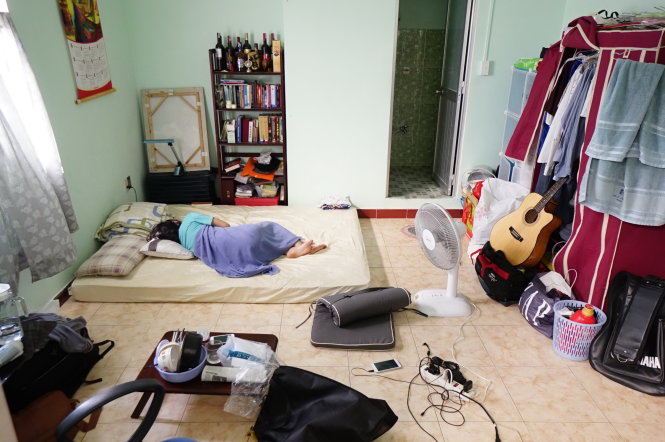In today’s world an increasing number of young people have become worryingly secluded strangers in their own homes, due to minimal contact with their family members and maximal use of digital devices.
Vietnamese experts put youngsters’ alienation down to their escalating use of smartphones, which is called smartphone addiction syndrome.
According to findings from the Global Connected Consumer Study 2014 by market research firm TNS, Vietnamese smartphone usage rose from 20 percent in 2013 to 36 percent last year.
TNS surveyed more than 1,000 Vietnamese people over the age of 16 in the first two quarters of 2014 for the research.
The findings showed that one out of three people in Vietnam, or 36 percent of the population of 90 million, owned a smartphone in 2014, nearly double the previous year’s figure.
The strongest growth in Vietnamese smartphone users was recorded among people from 16 to 24 years of age.
While people in this age category only accounted for 27 percent of the total number of Vietnamese smartphone users in 2013, the figure more than doubled to 58 percent in 2014.

A family go out together at a cafe in Hanoi, but they are all engrossed in their smartphones and do not say a word to one another. Photo: Tuoi Tre
Several experts and Tuoi Tre (Youth) newspaper readers also attributed youths’ estrangement to minimal contact and mutual understanding between these young people and their own folks, particularly parents.
Nhat Nguyen, a Tuoi Tre reader residing in Ho Chi Minh City, talked about two mindless daughters in a family he knows well.
Aged 25 and 27, the young women have been exempted from all household chores by their indulgent parents since they were young.
Their elderly parents do all the housework, including taking the young ladies’ bikes out and preparing their lunch boxes before they go to work every day.
They usually return home late into the night from outings with their friends and their parents cannot lock the doors or go to sleep until they make sure their girls have made it home safely.
When their parents were admitted to the hospital on different occasions, the young women rarely visited them and did not bother to find out what was wrong.
During their mother’s hospitalization, they left all the household chores to their elder brother, who returned home on a visit from abroad.
Likewise, Cao Long, a Hanoi reader, also complained about his 26-year-old younger sister, who has also been spoilt by his overprotective, pampering parents.
During the rare moments when Long’s sister is at home, she retreats to her own room and becomes completely engrossed in Facebook and its virtual world.
She shows almost no interest in what is happening around her, and is invariably indifferent to her parents, let alone her elder brother, his wife and their infant.
Long is baffled by a paradoxical fact that though an uncaring person in the real world, his sister emerges as a perfectly emotional, thoughtful Facebooker, who is willing or pretends to share and empathize with her virtual friends.

This Tuoi Tre illustration cartoon depicts a young man who is confined to his own virtual world with his smartphone and pays scanty attention to his parents.
Similarly Dr. Mai, living in Binh Tan District in Ho Chi Minh City, considers her two sons her greatest assets whom she has cosseted and doted on her entire life.
Right after she was hospitalized for cancer, she threw herself into housework and made sure the slightest demands from her two sons, who are a medical student and a 12th grader, are tended to.
Unable to hire a domestic helper as her boys do not like the presence of strangers in their home, Dr. Mai has battled both her debilitating illness and heavy loads of housework.
One day, her elder sister found her lying unconscious in the kitchen as she was too tired to eat for two days.
The boys, who either go to school or retreat to their own rooms to surf the Internet, were completely oblivious to their mother’s worsening condition.
Many others are unresponsive to their parents, grandparents and siblings and their communication is restricted to head nods and shakes, "yes" and "no" or curt replies.
Psychologist Vo Thi Minh Hue told Tuoi Tre that many parents from Ho Chi Minh City and other provinces have sought help in how to cope with their children’s alarming indifference.
She stressed that youth’s indifference will likely escalate without proper guidance, mutual understanding and sharing.
Hue urged that teenagers or young adults be armed with proper life skills and parents teach their children to be caring and appreciative of housework from a young age instead of being overprotective of or overly doting on them.
Like us on Facebook or follow us on Twitter to get the latest news about Vietnam!



















































